Best of #econtwitter - Week of July 31, 2022 [2/2]
Aug 01, 2022
Welcome readers old and new to this week’s edition of Best of Econtwitter. Please submit suggestions — very much including your own work! — over email or on Twitter @just_economics.
This is part two of two.
Paper summaries

Belgi Turan@belgi_turan
Our working paper with @Erdal_Tekin_ and @MevludeAkbulut is out. We study the long-term mental health consequences of war exposure during childhood, using the exogenous variation in the intensity of bombardment suffered by the German cities during World War II. 1/6 #econtwitter

7:23 AM · Jul 25, 2022
26 Reposts · 96 Likes

Lucas Warwar@LucasWarwar
Exploiting mass layoffs, they show that unemployment increases the probability of committing a crime by 23%. Effects are driven by economically-motivated crimes (+43%), but also violent crimes (+18%).
And effects persist for (at least) 4 years!!
2/6

5:28 PM · Jul 27, 2022
1 Repost · 16 Likes

Dean Eckles@deaneckles
Interesting new RCT on strategies for seeding a behavior in social networks without full knowledge of the network
doi.org/10.1073/pnas.2…

Nicholas A. Christakis @NAChristakis
In 50 chawls (residential buildings) in Mumbai, we mapped the networks of the 2,491 female head-of-households in order to try to enhance the adoption of iron-fortified salt to reduce neonatal and maternal anemia. 14/ https://t.co/FUbmUjgflP
9:39 PM · Jul 31, 2022
9 Reposts · 29 Likes

Lukas Freund@_LukasFreund_
Such a neat paper by @pontus_rendahl:
"Continuous vs. Discrete Time: Some Computational Insights"
🔗bit.ly/3Bn5kae

8:19 PM · Jul 27, 2022
60 Reposts · 274 Likes

Steven Ruggles@HistDem
Powerful critique of the Census Bureau's new disclosure control strategies by a group of prominent economists, just appeared in PNAS. /1
pnas.org/doi/10.1073/pn…

8:56 PM · Jul 27, 2022
93 Reposts · 223 Likes
Story of Abreu’s second-year paper

Basile Grassi@Basile_G
Are firm-level markup estimates unreliable?
They are much better than you may think!
Estimated markups correlate highly with true markups
🚨 "The Hitchhiker’s Guide to Markup Estimation" w/ @DeRidderMaarten (@LSEEcon) & @MorzentiG (@Unibocconi)
tinyurl.com/2p8zzx9n
🧵
tinyurl.com
DGM_v30July2022_submission.pdf

4:18 PM · Jul 29, 2022
52 Reposts · 204 Likes

Jakub Steiner@jakub_steiner
Imagine investors who repeatedly bet all their wealth. Despite the same opportunities, their wealth becomes concentrated exponentially over time. Those who'll end up owning nearly all the wealth will behave as if they solved a rational inattention problem. tinyurl.com/2p9p43xv

7:07 AM · Jul 29, 2022
14 Reposts · 87 Likes

Soheil Ghili@SoheilGhili
My theory paper on bundling got accepted today at AER Insights. In this thread, I summarize the main result and discuss the implications for empirical research on bundling/2nd-degree price discrimination. 1/7
5:26 PM · Jul 29, 2022
14 Reposts · 223 Likes

Arpit Gupta@arpitrage
Really fascinating JMP here by Hui Ding shows place based effects on mental illness, part of which can be attributed to provider capacity constraints.
stanford.edu/~khding/HuiDin…
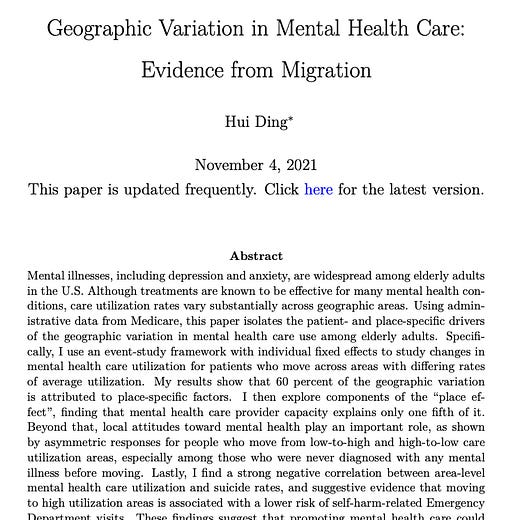
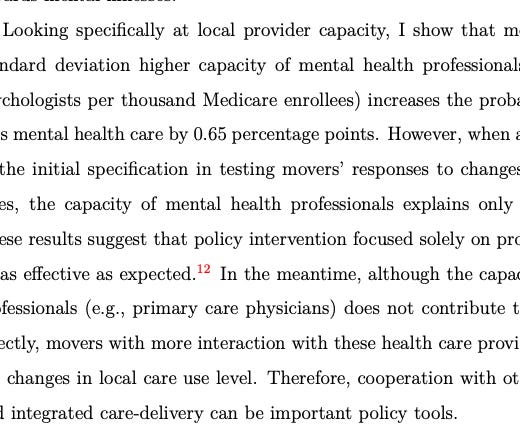
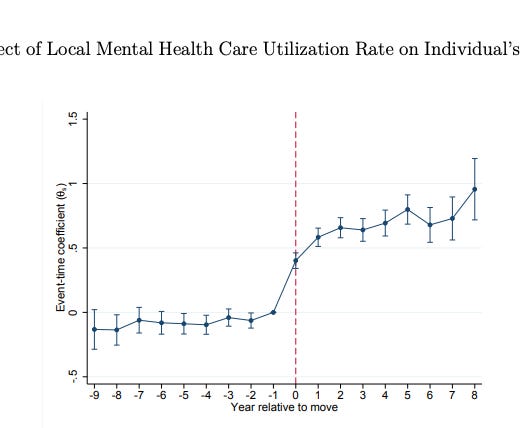
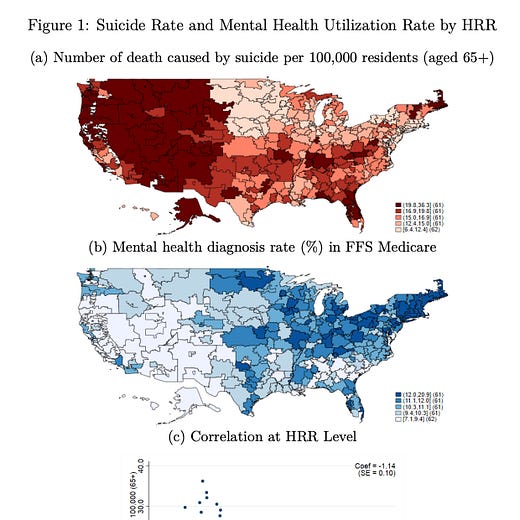

Zong Huang @zongyhuang
@arpitrage https://t.co/giqvylsIAP
8:34 PM · Jul 25, 2022
3 Likes

Matt Clancy@mattsclancy
Interesting proposal:
- post novel result as WP
- solicit replication
- give replicators coauthor credit
- publish bundle of original paper +replication https://t.co/TpQ3y90eqp

John List @Econ_4_Everyone
With the recent Alzheimer's story, it seems as though scientific fabrication has become all too common. One solution @lu_butera advanced is attached.
Could this have helped in the Alzheimer's case? What are other solutions?
#EconTwitter
https://t.co/KTIB3jRRev
12:31 PM · Jul 25, 2022
1 Repost · 15 Likes
More: Subjective Risk-Return Trade-off; bilateral labor agreements; equal credit opportunity act; couples & retirement planning; FEs; education field experiments; de-prosecution; violence against women at work
Interesting discussions

Ryan Briggs@ryancbriggs
Heck, someone with $$ could just offer bug bounties for people who discover substantive errors in the code of any article with above X number of citations or published in some list of good journals or whatever and then let other people do the sleuthing.
5:16 PM · Jul 28, 2022
10 Reposts · 92 Likes

Alex Imas@alexoimas
There’s a lot to like about twitter, but my fav is the democratization of discourse. You have grad students interacting w/ faculty from institutions all over the world. And everyone’s learning from each other.
That’s cool.
Wish it was around when I was a youngster.
3:25 PM · Jul 30, 2022
36 Reposts · 405 Likes

Noah Haber@NoahHaber
Hot take: the "students don't read the syllabus" thing is really a "we are for some reason still putting all the most important information in paper analogue PDFs in 2022 instead of a wiki or similar" thing.
9:57 PM · Jul 29, 2022
14 Reposts · 263 Likes

Dr. Sarah Sheffield@sarahlsheffield
Hey, new faculty!! Congrats on your new jobs. If you’d find it helpful, I’ve made a list of the stuff that’s made my life a lot easier in this chaos job. I can’t promise I know what I’m doing myself, but I hope these might help you as you adjust! 1/probably too many
6:34 PM · Jul 31, 2022
28 Reposts · 103 Likes

Alessandra Peter@Ale_M_Peter
Exposure therapy, AP edition.

12:57 PM · Jul 27, 2022
8 Reposts · 223 Likes

Ethan Mollick@emollick
Data visualization inspiration thanks to DALL-E: how Rothko, Basquiat, Picasso, and Monet would create an academic chart.

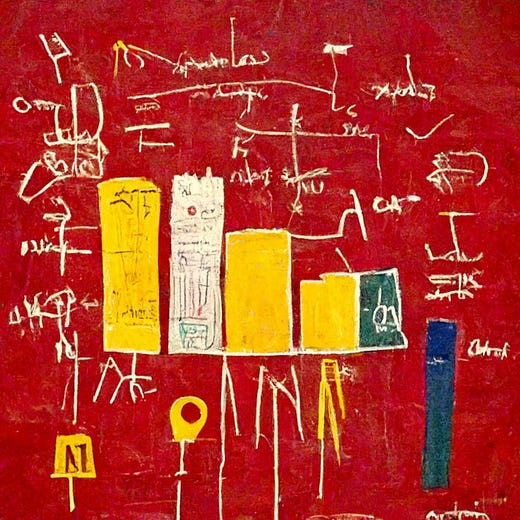
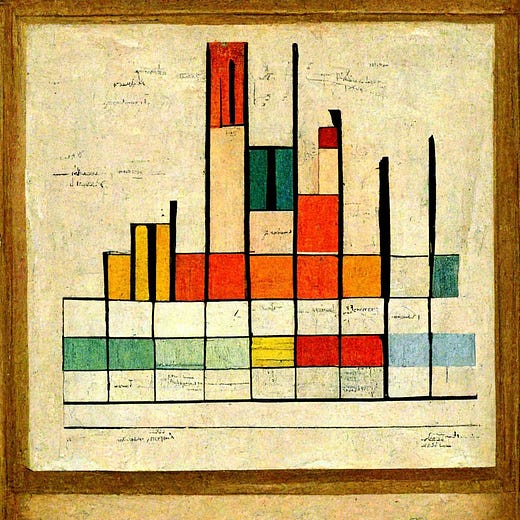
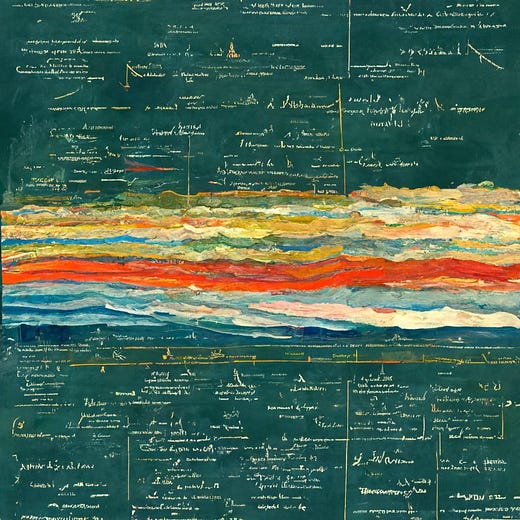
6:35 PM · Jul 27, 2022
3.8K Reposts · 19.6K Likes

